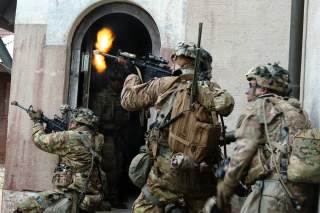Europe Needs to Calculate for the U.S. Military's Shortcomings
European governments can either think very hard about the obvious implications stemming from the United States’ inability to fight two major powers at the same time or neglect them altogether.
Nevertheless, by foreseeing the implications of a U.S.-Russia rapprochement today, European NATO members are by no means doomed to being invaded and blackmailed by Russia. Still, time is of the utmost importance. While Russia might make it its sine qua non that NATO dissolves when the rapprochement is put into practice, Europeans are still able to shape the conditions under which they would have to accept the eventual American decision in favor of Russia. As such a decision is most unlikely to occur before Trump’s re-election in 2021, there is still very valuable time left that must be used properly.
In particular, Europeans should pursue a twofold and complementary approach in order to interfere with Putin’s calculations. For this to work, they would have to act swiftly. To begin, while the present Russian edge in anti-access area-denial, conventional missiles, and cyber/social media manipulation is significant, it can be fairly easily blunted. The key to European nations—restoring their own ability to deter and defeat Russian aggression—lies in modernizing and transforming defense and security by the bold, rapid application of combinations of digital age technology. This means rebuilding air and missile defenses to deal with the threat of hypersonic ballistic and cruise missiles (nuclear, and above all, conventional). It also means moving quickly on from capability that depends on the dwindling number of expensive manned platforms and static bases (maritime, land, and air) that are now highly vulnerable (from space) in a transparent battlespace to precision attack. Indeed, Europe needs its own precision long-range missiles and should build conventional armed forces that are a thoughtful mix of smaller, more numerous and agile manned, unmanned, and autonomous capability. It means harnessing secure cloud, data, artificial intelligence, advanced connectivity and vast Single Synthetic Environments to understand, decide and act faster, better and more decisively than Russia. It also means becoming competitive in hybrid or gray-space confrontation, channeling all means of hard, soft (including cyber and social media) and private sector power to advance European interests and values in the face of daily Russian intrusion and destabilization.
In parallel, to effectively influence Russia’s predictably heavy-handed, revisionist approach, Europeans should establish a new common nuclear umbrella. Anticipating the moment when U.S. nuclear security will be gone should lead to the realization that the clearly emerging imbalance in terms of nuclear capabilities must be rebalanced by Europe; otherwise, the gates to political blackmailing will be wide open. The great advantage of this strategy, if duly implemented, is that it would credibly (since Europeans would be averse to losing their way of life) affect Putin’s calculations even before the latter starts thinking more seriously about how to execute his plans of claiming his prize for abandoning China in 2021.
The crucial point about the new European nuclear umbrella is precisely that it preserves the psychological element in the balance of power vis-a-vis Russia during a time of uncertainty about Europe’s security. It is critical to understand this, as the point made above about the psychological elements of every balance of power equally pertains to the Europeans. In fact, it may be said that while Europeans could, rationally, be expected to stand ever closer together and muster their strengths in light of the United States’ predicted departure, such a psychological shock might also lead to exactly the opposite result: a rapid process of dissolution. Consequently, some members could defect from NATO early on and even bandwagon with Russia. In fact, Europe might, without its hard military and psychological American shell, turn out to be surprisingly malleable. The nuclear umbrella would fundamentally help pre-empt this process of perforating Europe’s cohesion in the wake of the prospect of an anticipated American withdrawal from Europe.
The United Kingdom, Germany, Poland and the European Commission will soon choose new leaders. Together with their fellow European governments they have the choice today to either think very hard about the quite obvious implications stemming from the United States’ inability to fight two major powers, or to neglect them altogether. As Kissinger put it in 1965: “[T]here are two kinds of realists: those who use facts and those who create them. The West requires nothing so much as (wo)men able to create their own reality.” Fifty-four years on, there is still nothing to add to his admonition.
General Sir Richard Barrons KCB CBE served as Commander Joint Forces Command until April 2016. He is Co-Chairman of Universal Defence & Security Solutions.
Dr. Maximilian Terhalle (@M_Terhalle) is Associate Professor of Strategic Studies at Winchester University and Senior Research Fellow at King’s College London. – His research synthesizes the notions of strategy, strategy-making, and world order, focussing on the dynamics between United States, China and Russia and what implications they have for Europe.
Image: Flickr / U.S. Department of Defense

